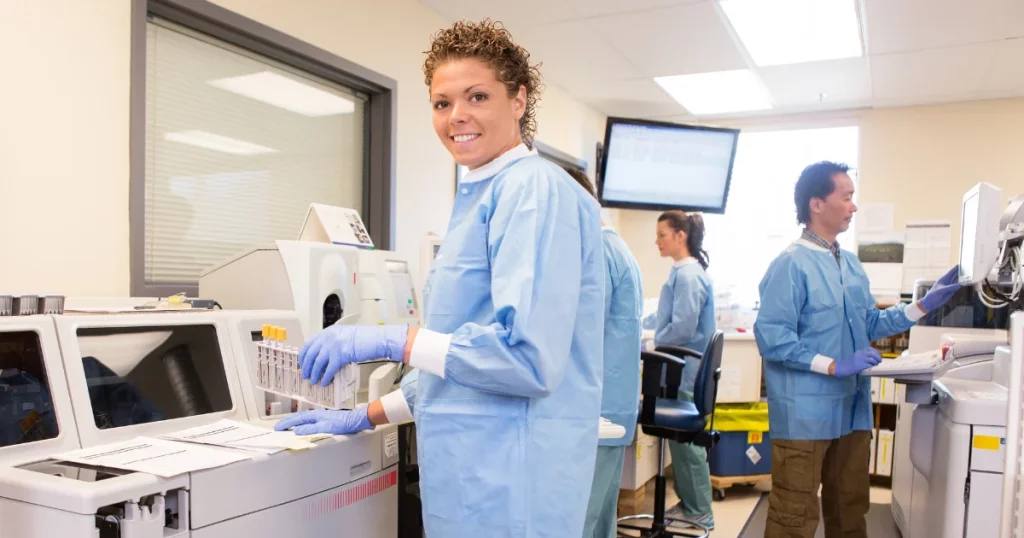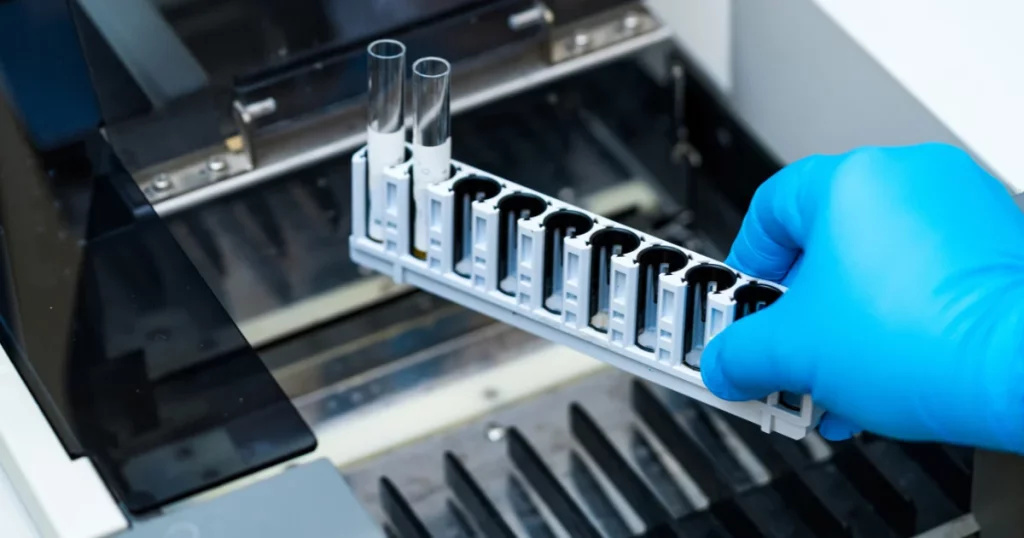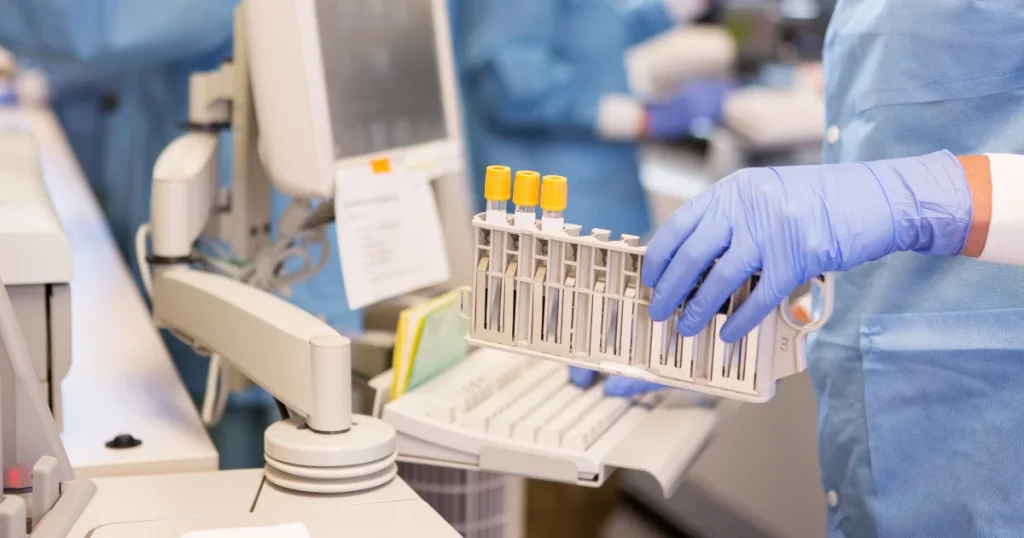Imagine a scenario where precise diagnoses are the linchpin for effective medical interventions. In this realm, immuno-chemistry analyzers emerge as pivotal instruments, revolutionizing the landscape of advanced medical testing. This guide navigates through the intricacies of immunoassays and the transformative role of immuno-chemistry analyzers in healthcare.
Table of Contents
Demystifying Immunoassays
To comprehend the prowess of immuno-chemistry analyzers, understanding immunoassays is fundamental. Immunoassays are powerful techniques used in laboratories to detect and quantify various substances, and they operate based on the principles of antigen-antibody interactions. Here’s a breakdown of the basic concepts:
1. Antigens and Antibodies
At the heart of immunoassays are antigens (substances that trigger an immune response) and antibodies (proteins produced by the immune system to recognize and neutralize antigens). Immunoassays leverage the specificity of antigen-antibody binding.
2. Target Molecule Recognition
Immunoassays exhibit high specificity in recognizing and binding to target molecules. This specificity ensures that the assay accurately detects and measures the presence of the desired substance, whether it’s a protein, hormone, or other biomolecule.
3. Types of Immunoassays
- Enzyme-Linked Immunosorbent Assay (ELISA): In ELISA, a plate is coated with an antigen, and the binding of antibodies to the antigen is detected through an enzymatic reaction.
- Radioimmunoassay (RIA): RIA uses radioactive isotopes to label antigens or antibodies, allowing for the measurement of radioactivity to quantify the target substance.
- Chemiluminescent Immunoassay (CLIA): CLIA employs chemiluminescent molecules to produce light, with the intensity of the light correlating with the concentration of the target molecule.
4. Precision in Target Detection
Immunoassays are renowned for their ability to precisely detect specific substances, even in complex biological samples. This high specificity makes them invaluable in various fields, including clinical diagnostics and research.
In summary, immunoassays capitalize on the specific interactions between antigens and antibodies. Their versatility and accuracy make them essential tools in laboratories for a wide range of applications, from diagnosing diseases to exploring the intricacies of biological processes.
Also read: Understanding Blood Coagulation: A Guide to Analyzers, Functions, and Applications
Enter the Immuno-Chemistry Analyzer

Immuno-chemistry analyzers automate and streamline immunoassays, enhancing the efficiency of diagnostics. We provide a glimpse into the basic workflow, touching upon crucial features such as the range of analytes detected, test menu versatility, sensitivity, specificity, and automation levels, all contributing to the precision of results.
Function
Immuno-chemistry analyzers represent a technological leap in laboratory diagnostics, automating and streamlining immunoassays for enhanced efficiency and accuracy. These analyzers play a pivotal role in expediting the detection and quantification of various analytes.
Workflow
The basic workflow of an immuno-chemistry analyzer involves automating the intricate steps of immunoassays. From sample loading to result generation, these analyzers handle processes such as reagent addition, incubation, and signal detection, ensuring a seamless and standardized testing procedure.
Key Features
1. Types of Analytes Detected: Immuno-chemistry analyzers are versatile, and capable of detecting a wide range of analytes, including proteins, hormones, antibodies, and more. This broad applicability makes them indispensable in various fields, from clinical diagnostics to research.
2. Test Menu Size and Versatility: These analyzers boast expansive test menus, offering a diverse array of assays. The versatility in the types of tests available allows laboratories to address a multitude of diagnostic needs, adapting to evolving healthcare requirements.
3. Sensitivity and Specificity: Immuno-chemistry analyzers deliver high sensitivity and specificity in test results. The ability to precisely detect and quantify target molecules ensures accurate diagnoses, contributing to the reliability of patient outcomes.
4. Automation Level and Processing Speed: With a high level of automation, these analyzers significantly reduce manual intervention, minimizing the risk of errors and enhancing overall efficiency. The swift processing speed further expedites the delivery of results, facilitating timely decision-making in healthcare settings.
In essence, immuno-chemistry analyzers represent a technological pinnacle in laboratory medicine, harnessing automation and advanced capabilities to propel the field of immunoassays forward. Their comprehensive features make them indispensable tools for modern laboratories striving for accuracy, efficiency, and adaptability.
Unveiling the Power of Advanced Testing

The applications of immuno-chemistry analyzers extend across various realms of medical diagnostics. From diagnosing autoimmune diseases, allergies, infectious diseases, to monitoring medication effectiveness and aiding in drug development, these analyzers play a pivotal role. We explore their significance in advanced diagnostics and medical research, outlining their contribution to improved patient outcomes.
Diagnosing and Monitoring Diseases with Precision
1. Autoimmune Diseases: Unraveling Complex Conditions
Immuno-chemistry analyzers prove invaluable in diagnosing autoimmune diseases such as rheumatoid arthritis and celiac disease. By detecting specific antibodies and proteins indicative of these conditions, these analyzers aid in early diagnosis and ongoing monitoring.
2. Allergies and Intolerances: Pinpointing Culprits
For individuals with allergies or intolerances, immuno-chemistry analyzers contribute to pinpointing specific allergens or intolerances. This includes identifying food allergies, drug allergies, and other immune-related reactions.
3. Infectious Diseases: Early Detection and Management
In the realm of infectious diseases, immuno-chemistry analyzers play a crucial role in early detection and effective management. From HIV to hepatitis, these analyzers help identify specific antigens or antibodies, facilitating timely intervention and monitoring.
4. Certain Cancers: Aiding in Oncological Diagnostics
Immuno-chemistry analyzers assist in the diagnosis of certain cancers, including prostate cancer and certain types of leukemia. By detecting specific biomarkers associated with these cancers, these analyzers contribute to early diagnosis and treatment planning.
5. Monitoring Medication Effectiveness: A Precision Approach
Beyond diagnostics, immuno-chemistry analyzers are instrumental in monitoring medication effectiveness. This includes tracking medication levels, especially relevant for drugs like immunosuppressants, and assessing the patient’s response to treatment.
6. Immuno-Chemistry Analyzers in Testing New Medications
Immuno-chemistry analyzers are essential for testing the effectiveness and safety of new medications. These analyzers help researchers understand how drugs interact with the immune system and whether they elicit the desired responses.
7. Immuno-Chemistry Analyzers in Studying Diseases and Biomarkers
Medical research relies heavily on immuno-chemistry analyzers to study various diseases and biomarkers. These analyzers aid researchers in understanding the underlying mechanisms of diseases, identifying potential therapeutic targets, and validating hypotheses.
In essence, immuno-chemistry analyzers are not just diagnostic tools; they are transformative instruments shaping the landscape of advanced medical diagnostics, disease monitoring, and medical research. Their applications span a spectrum of healthcare needs, underscoring their significance in modern healthcare practices.
Beyond the Basics: Advantages and Considerations

The advantages of immuno-chemistry analyzers are multifaceted. We delve into their high accuracy, increased sensitivity, and automation benefits, providing faster turnaround times for test results. However, we also shed light on considerations such as potential interference in some assays and the critical importance of proper sample handling and quality control.
1. Advantages of Immuno-Chemistry Analyzers
a. High Accuracy and Reliability: Immuno-chemistry analyzers are known for providing high accuracy and reliable test results. The precision offered by these analyzers enhances diagnostic confidence and ensures that healthcare professionals can make informed decisions based on trustworthy data.
b. Increased Sensitivity: Compared to traditional methods, immuno-chemistry analyzers boast increased sensitivity. This heightened sensitivity allows for the detection of smaller concentrations of analytes, enabling early diagnosis and precise monitoring of disease progression.
c. Automation for Faster Turnaround: The automation capabilities of immuno-chemistry analyzers lead to faster turnaround times for test results. This not only improves efficiency in healthcare settings but also enables prompt decision-making and intervention when needed.
2. Considerations in Immuno-Chemistry Analysis
a. Potential for Interference: While highly accurate, immuno-chemistry analyzers may face potential interference in some assays. Understanding the specificities and limitations of each test is crucial to ensuring reliable results and preventing misinterpretation.
b. Importance of Proper Sample Handling: The accuracy of immuno-chemistry analysis is highly dependent on proper sample handling. Ensuring correct storage, transportation, and processing of samples is essential to obtain reliable and valid results.
c. Quality Control Measures: Implementing robust quality control measures is paramount in immuno-chemistry analysis. Regular calibration and validation of analyzers, as well as adherence to established protocols, contribute to the overall reliability of test results.
In summary, while immuno-chemistry analyzers offer a host of advantages, users must be cognizant of potential challenges and considerations. The benefits of high accuracy, increased sensitivity, and automation make these analyzers powerful tools in healthcare, provided that users navigate potential limitations with diligence and adherence to best practices.
The Future of Advanced Testing
As we gaze into the future, emerging trends in immuno-chemistry analyzers come into focus. From the development of new assays for enhanced testing to increased automation and integration with laboratory information systems, we witness the evolution of these analyzers. This section offers a glimpse into the potential advancements in point-of-care testing capabilities.
1. Development of New Assays
The future of immuno-chemistry analyzers holds promise in the development of new assays that offer even greater specificity and sensitivity. Ongoing research and technological advancements aim to expand the range of detectable biomarkers, enabling more precise diagnostic capabilities.
2. Increased Automation and Integration
A significant trend involves the continued automation of immuno-chemistry analyzers and their integration with laboratory information systems (LIS). This integration enhances workflow efficiency, allowing seamless communication between analyzers and data management systems. Automation not only expedites testing processes but also contributes to error reduction and streamlined laboratory operations.
3. Advancements in Point-of-Care Testing
The future envisions advancements in point-of-care testing capabilities with immuno-chemistry analyzers. Miniaturization of technology and improvements in portability may facilitate on-the-spot testing, bringing the diagnostic power of immuno-chemistry to diverse healthcare settings. This shift toward point-of-care applications could revolutionize accessibility to advanced testing, especially in resource-limited environments.
As technology continues to evolve, immuno-chemistry analyzers are poised to play an increasingly pivotal role in advanced diagnostics. The combination of novel assays, enhanced automation, and broader accessibility through point-of-care solutions holds great potential for improving patient care and expanding the scope of diagnostic capabilities in the medical field.
Conclusion
Summarizing the journey through the diagnostic landscape, we underscore the key role of immuno-chemistry analyzers in advancing medical testing. Their impact on patient care and health outcomes is undeniable. We encourage readers to explore further, fostering a proactive approach to healthcare. However, we emphasize the necessity of consulting healthcare professionals for personalized medical advice, ensuring a holistic and informed approach to diagnoses and treatment plans.
Disclaimer: This guide provides insights into immuno-chemistry analyzers for informational purposes. For personalized medical advice, consult with a healthcare professional.
FAQ
What are immunoassays, and how do they operate based on the principles of antigen-antibody interactions?
Answer: Immunoassays are powerful laboratory techniques that detect and quantify substances using the specificity of antigen-antibody interactions. They involve antigens (triggering immune responses) and antibodies (immune system proteins) to precisely recognize and measure target molecules.
Can you explain the types of immunoassays, such as ELISA, RIA, and CLIA, and their respective applications in diagnostics and research?
Answer: Immunoassays include ELISA (enzyme-linked immunosorbent assay), RIA (radioimmunoassay), and CLIA (chemiluminescent immunoassay). ELISA detects antibodies through enzymatic reactions, RIA uses radioactive isotopes for quantification, and CLIA employs chemiluminescent molecules. They are versatile in clinical diagnostics and research.
What is the significance of immuno-chemistry analyzers in automating and streamlining immunoassays, and how do they contribute to enhanced efficiency and accuracy?
Answer: Immuno-chemistry analyzers automate immunoassays, handling processes like reagent addition and signal detection. They enhance diagnostic efficiency and accuracy by automating intricate steps, ensuring standardized testing procedures.
What are the key features of immuno-chemistry analyzers, including the types of analytes detected, test menu versatility, sensitivity, specificity, and automation levels?
Answer: Immuno-chemistry analyzers detect a wide range of analytes, offering versatile test menus with high sensitivity and specificity. They exhibit a high level of automation, reducing manual intervention and ensuring swift processing for efficient results.
How do immuno-chemistry analyzers contribute to diagnosing autoimmune diseases, allergies, infectious diseases, and certain cancers?
Answer: Immuno-chemistry analyzers aid in diagnosing autoimmune diseases by detecting specific antibodies. They pinpoint allergens for allergy sufferers and play a crucial role in early detection and management of infectious diseases and certain cancers, revealing biomarkers associated with these conditions.
In addition to diagnostics, how do immuno-chemistry analyzers assist in monitoring medication effectiveness and contribute to testing new medications in medical research?
Answer: Immuno-chemistry analyzers monitor medication effectiveness by tracking levels, especially for immunosuppressants. They are essential in testing new medications, helping researchers understand immune system interactions, ensuring drug safety, and evaluating therapeutic responses.
What are the advantages of immuno-chemistry analyzers, such as high accuracy, increased sensitivity, and automation benefits?
Answer: Immuno-chemistry analyzers provide high accuracy, increased sensitivity, and automation benefits, leading to faster turnaround times. Their precision enhances diagnostic confidence, enabling informed decisions based on reliable data.
What considerations should users be aware of in immuno-chemistry analysis, including potential interference and the importance of proper sample handling?
Answer: Users should be aware of potential interference in some assays and prioritize proper sample handling for accurate results. Understanding test specificities and adhering to quality control measures is crucial.
How do emerging trends in immuno-chemistry analyzers include the development of new assays, increased automation, and integration with laboratory information systems?
Answer: Emerging trends involve developing new assays for greater specificity and sensitivity, increasing automation, and integrating with laboratory information systems. These trends enhance workflow efficiency and facilitate seamless communication between analyzers and data management systems.
What is the future outlook for immuno-chemistry analyzers, including advancements in point-of-care testing capabilities and their potential impact on accessibility in diverse healthcare settings?
Answer: The future of immuno-chemistry analyzers includes advancements in point-of-care testing capabilities, with potential miniaturization and improved portability. This shift could revolutionize accessibility, especially in resource-limited environments, expanding the scope of advanced testing.




